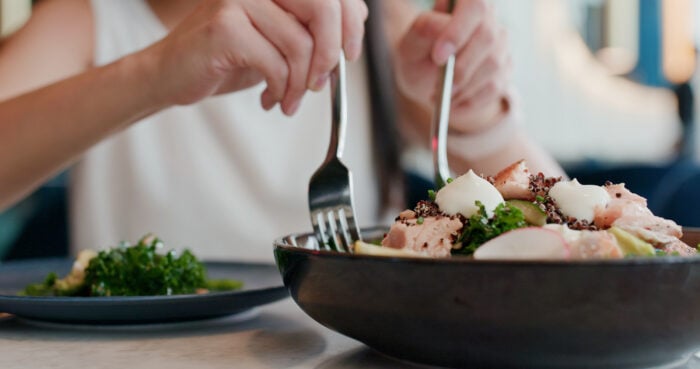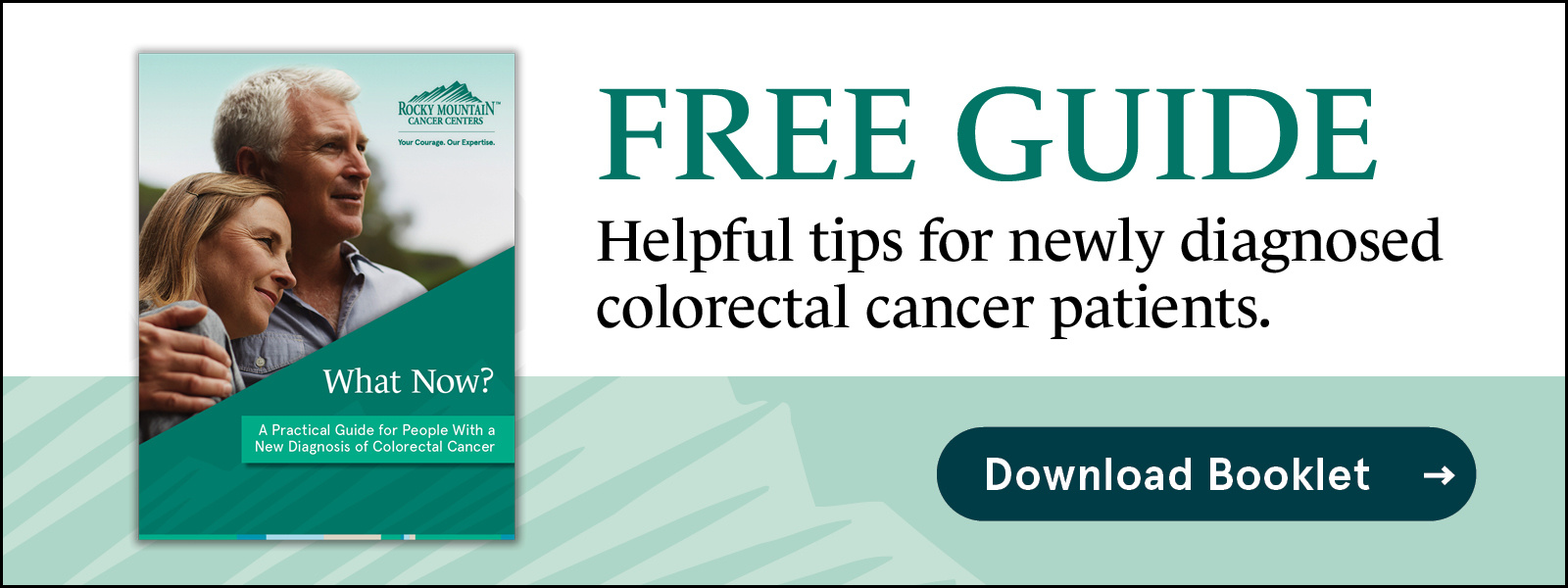
It only makes sense that our colon, which processes the wastes remaining after our food is digested, is impacted by what we eat. Our small intestine absorbs the nutrients from the foods we eat — our colon absorbs the water and excess salt and processes the indigestible part into waste. “We are what we eat” rings true when talking about our risk for colon cancer.
Facts about Colon and Rectal Cancer
Colon and rectal cancer are often referred to as colorectal cancer — because they are more similar than different and are treated with the same medications and similar surgeries.
Men and women are equally affected by colorectal cancer. Diagnosis and death rates have been declining for 30+ years — due to earlier diagnosis, improved treatments, and lifestyle changes. Yet, colorectal cancer is the second leading cause of cancer deaths in the United States. That being said, it is still a serious disease that needs to be taken seriously.
Recently there’s been an increase in the number of colorectal cancer patients under age 55. People in their 20s and 30s are being diagnosed and that could be closely related to the food they eat. With many young people leading more sedentary lives and with a much higher obesity rate at an earlier age in our country, researchers see that the rise in rates for colorectal cancer among young adults corresponds to the rise in obesity in the U.S.
If you experience rectal bleeding or anything unusual in your bowel movements, talk to your doctor, regardless of your age. The American Cancer Society recommends regular screenings for colorectal cancer begin at age 45.
How does our diet impact our risk of developing colon cancer?
Our lifetime risk for colorectal cancer is 1 in 23 (4.4%) for men and 1 in 25 (4.1%) for women. While that might not seem like a big risk, think about your circle of family and friends. Suppose 100 people attend your family reunion – four of them will probably develop colorectal cancer in their lifetime.
But we can reduce our risk of colorectal cancer by modifying our diet. A recent study published in The Journal of the American Medical Association (JAMA) showed that pesco-vegetarians (people who eat fish, seafood, eggs, and dairy) and vegetarians had significantly lower rates of colorectal cancer. The “fish-eaters” experienced a 45% reduction in their risk of colorectal cancer. Vegetarians (people who eat vegetables, fruits, eggs, and dairy) had a 22% risk reduction. Vegans, who don’t eat any animal products like meat, eggs, or dairy, saw a 16% decline in risk.
Study after study shows that a diet rich in fruits and vegetables and eating less red meat reduces our risk of colorectal cancer.
What foods should we avoid, and why?
Make gradual changes to maintain the changes for a lifetime. We, humans, are capable of “reprogramming” our taste buds. It takes about 4-to-8 weeks to become accustomed to new or different tastes.
Foods linked to colorectal cancer:
- Bacon and other processed meats. Processed meats are preserved by curing, fermentation, salting, smoking, or adding chemical preservatives. Processed meats include bacon, cold cuts, beef jerky, ham, hot dogs, corned beef and pastrami, salami/pepperoni, smoked sausages, and deli meat. A 2017 study by the American Institute for Cancer Research (AICR) showed that consuming 50 grams (one hotdog) of processed meat daily amounts to a 16% increased risk of colorectal cancer. Processed meat contains three chemicals associated with colorectal and stomach cancer.
- Red meat. Red meat is not just beef — pork, lamb, veal, venison, and goat are all considered “red meat.” According to an analysis conducted by the National Institutes of Health (NHI) of 22 studies done worldwide, there is a positive link between eating red meat more than once a day and cancer in both the colon and rectum. Have a small steak or pork chop; enjoy the venison roast. But swap out the amount of red meat and eat more chicken and fish. The American Institute for Cancer Research recommends no more than 18 oz. (cooked weight) of red meat weekly.
- Alcohol. Alcohol is classified as a carcinogen by the World Health Organization. When alcohol breaks down in our body, it is converted into acetaldehyde, a chemical that can directly damage our DNA. Once our DNA is damaged, normal cells don’t always reproduce accurately, and cancer can develop. The American Institute for Cancer Research (AICR) recommends that people only drink moderate amounts of alcohol — one drink daily for women and two drinks for men. Data shows that 2-to-3 drinks daily increases the risk of colorectal cancer by 20%. Heavy drinking (more than 3 drinks daily) increases the risk of colorectal cancer by 40%.
- Sugar-sweetened beverages. Obesity is a risk factor, not only for colorectal cancer but for many other cancers. A major contributing factor for obesity is the consumption of “empty” calories in sodas, sugar-sweetened coffee drinks like lattes, and canned and bottled juice beverages that often contain added sugar.
What foods are good for your colon health, and why?
- Beans. Beans, like kidney, pinto, and black beans, are high in protein and fiber along with vitamins B and E. Fiber helps move waste through our colon. Beans contain flavonoids that help prevent tumor growth.
- Dairy. Eating dairy products reduces the colon's growth of polyps (adenomas). These benign (non-cancerous) polyps may develop into cancerous tumors. Dairy is rich in protein and calcium — building strong muscles and bones.
- Fruits and Vegetables. Fruits and vegetables provide fiber to help shorten the time that waste stays in our colon. Eat fruits and vegetables of every color to get all the vitamins and minerals our bodies need.
- Whole grains. Whole grains are linked to a lower risk of colon and rectal cancer. Fiber adds bulk to our digestive system — shortening the time that waste stays in the colon. Waste often contains carcinogens (from the foods we eat) so shortening the time that carcinogens come in contact with our colon decreases our risk of colorectal cancer. Whole grains include oatmeal, whole-grain bread, and brown rice. Try to eat 3-to-5 servings daily. Not only do they taste good, but they help fight off hunger.
What Other Things Can We Do to Maintain Good Colon Health?
Physical activity is good not only for our heart health but also for our colon health. The American Cancer Society recommends 150-to-300 minutes of moderate activity or 75-to-150 minutes of strenuous activity weekly. Women appear to be at more cancer risk than men if they don’t exercise. Lack of physical activity is strongly linked to colon and breast cancer in women.
Avoid staying seated for long periods — this is called “sedentary time” and is different from lack of activity. “Sitting time” has dramatically increased. We sit at our desks, at the computer, watching TV, or on our phones. Prolonged sitting contributes to heart disease and type 2 diabetes. Because type 2 diabetes is linked to an increased risk for colorectal cancer, err on the side of caution. Get up at least once every hour and move around for about 5 minutes.
Little changes add up to better eating habits and more physical activity — while reducing your risk of colon or rectal cancer.
Updated January 2024

